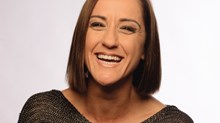Breaking Bad and the Antihero in Me
From its first episode in 2008 to its dramatic conclusion Sunday night, Breaking Bad was the story of Walter White, a chronicle of how a mild-mannered high school chemistry teacher became a major player in the New Mexico meth scene. Like so many of the TV protagonists of the last 10 years, Walt was an "antihero," a man who rejected traditional morality and increasingly embraced his worst qualities. The thing about antiheroes: when we live inside their stories, we often find ourselves embracing their twisted logic, rationalizing their despicable actions, and rooting for their success over foes who try to get in their way.
And this is exactly what makes them so compelling. We can see in an antihero the parts of ourselves we'd rather ignore, and we confront the reality that given a particular set of circumstances maybe we, too, would do things of which we would never believe ourselves capable.
Skyler White: lady in waiting
This was especially obvious in the character of Skyler, Walt's wife, in Breaking Bad. The story of Walt is also the story of Skyler, the woman he loves and built a life with, the woman whose continued financial security he works to secure. At first he keeps her in the dark about his secret criminal life, and her constant demands to know where he has been and why he has been acting so strange—questions the audience already knows the answer to—made her seem naive at best, and ignorant at worst.
When she finally finds out what her husband has been up to and demands a divorce, she becomes another obstacle in Walt's way. Why can't she see, Walt continually grumbles, that everything I've done has been to provide for and protect my family?
Skyler is strong, but strength is not always triumphant. She is a woman who is forced to react to things that happen to her, things that are out of her control and yet yank away what safety and stability she has in her life. She finds herself in impossible situations: in which doing the "right" thing by turning her husband into the feds would result in more suffering for those she loves, while sticking with him and making herself complicit in his crimes—even becoming his business partner—means having to live with her decisions and someday deal with having to explain them to her children.
In a pivotal scene, she tells Walt, "I don't know what to do. I'm a coward. I—I can't go to the police, I can't stop laundering your money, I can't keep you out of this house, I can't even keep you out of my bed. All I can do is wait. That's it, that's the only good option. Hold on. Bide my time. And wait."
We root for her to find the courage she lacks, to refuse to settle for waiting while others decide her fate.
The rise of the antihero
The last few years have seen the rise of the female antihero on the small screen, after years dominated by Tony Sopranos and Jack Shepherds and Don Drapers. Carrie Mathison (played by Claire Danes) on Homeland and Olivia Pope (played by Kerry Washington) on Scandal have both brought portrayals of complex, modern womanhood to an audience hungry for strong leading ladies. Both women are extremely intelligent, motivated, and good at their jobs. They bring bad guys to justice: Carrie as a CIA agent, and Olivia as head of a high-profile "crisis management" firm in Washington, D. C. But both women also have fatal flaws, and often pursue their own selfish desires at the expense of what is good and right and just. For both of these women, that means entangling themselves in relationships with men who should be off-limits, and allowing those relationships to interfere with their work and hurt others in the process.
Stories don't need to be instructive to be powerful and good. I'm happy that women are finally getting their moment in the spotlight, and that TV shows are reflecting the fact that women are just as complicated and just as susceptible to sin as men. We are not moral beacons, untouched by temptation and consequences. What made Breaking Bad so great was its depiction of evil, and how a person doesn't wake up one morning and decide to be bad—rather, it's a series of small, seemingly necessary decisions made in a moment of crisis that over time radically change the way a person sees and operates in the world. This is true for Walt, and it is also true for Sklyer. The woman who was once horrified to learn of her husband's crimes over time accepts the narrative her husband has presented them as and resigns herself to do what she can to minimize the damage to the people she cares about most deeply. These stories are compelling because they are real, and relatable, and remind us that the difficult questions and decisions we face really and truly matter.
Every decision matters
It is in those seemingly insignificant moments, those little decisions we face every day in which we must choose what desires to pursue and what kind of woman we want to be, that we are making our story. There are a lot of seemingly good things that can guide our decisions—safety , financial security, love, friendship—but there are no spiritually neutral areas of our lives. Not even what food we eat or what we drink: "So whether you eat or drink or whatever you do, do it all for the glory of God" (1 Cor. 10:31). We run into trouble when we convince ourselves that a single decision doesn't matter, that we can pursue something else for a time and it won't change our path.
Even when we have messed up—and we will mess up—there is hope. If we are in Christ, we aren't beholden to those old patterns anymore. "Therefore, if anyone is in Christ, he is a new creation. The old has passed away; behold, the new has come" (2 Corinthians 5:17).
Our actions always have consequences, and we must accept those consequences. Sometimes, as with Skyler, we may be too deep in it to change the outcome for now—but God is always making us new. This is what makes antiheroes so compelling. We can relate to them in our failures, and we can also hope that maybe this time, they will choose the choice that won't ruin their lives and the lives of those around them.
We can all change. It's not only our hope, it's the purpose that drives us forward toward the day when God will take what we have rendered hopeless and make it wonderfully, gloriously new.
Subscribe to TCW's free email newsletter at this link for weekly updates and chances to win free books and music downloads.
Laura Leonard is associate editor of BuildingChurchLeaders.com. Follow Laura on Twitter at @lmarieleonard.
Read more articles that highlight writing by Christian women at ChristianityToday.com/Women
 Read These Next
Read These Next

 Overcoming Sexual AddictionThe real remedy to pornography
Overcoming Sexual AddictionThe real remedy to pornography
 Christine Caine: Abused but Not DefeatedThis Hillsong Bible teacher overcame a childhood of sexual abuse to become a fearless crusader for Christ in the fight against human trafficking.
Christine Caine: Abused but Not DefeatedThis Hillsong Bible teacher overcame a childhood of sexual abuse to become a fearless crusader for Christ in the fight against human trafficking.








 Homepage
Homepage